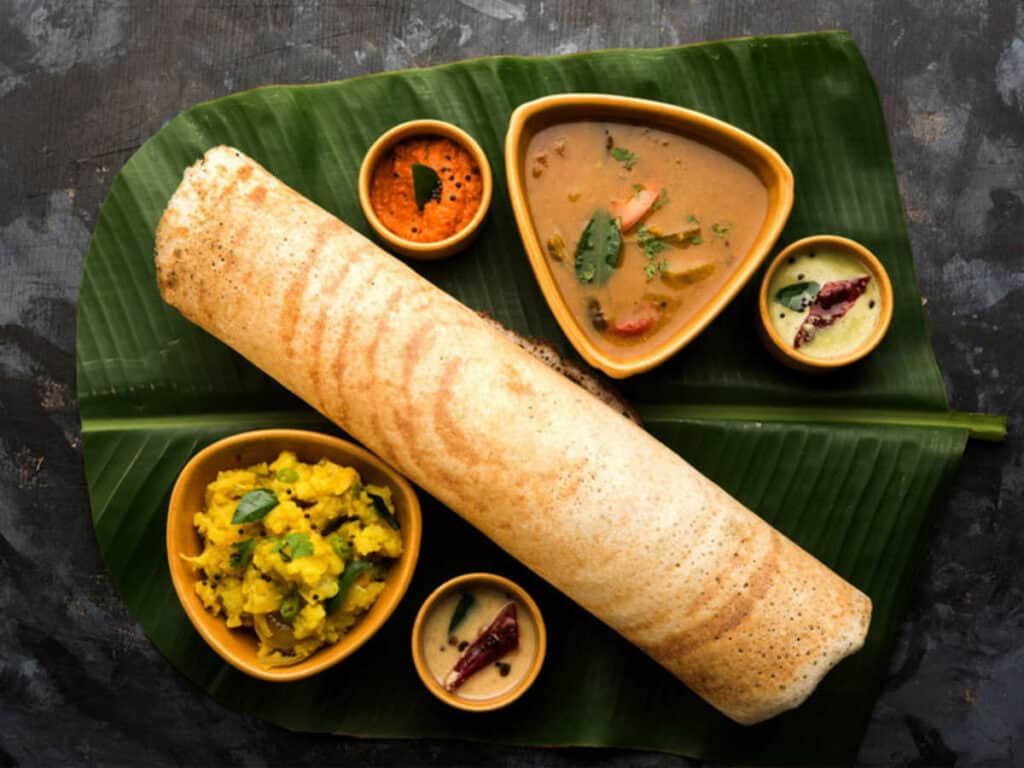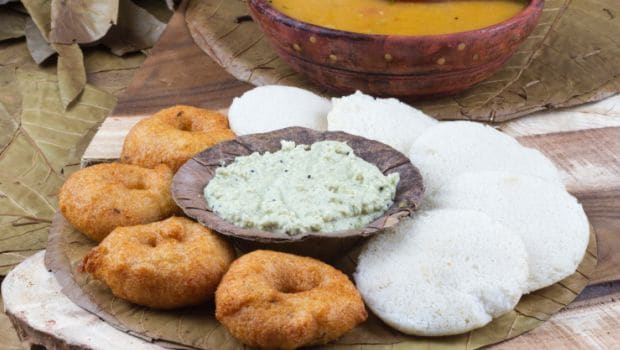Have you ever tried dosa, the delicious fermented pancake from southern India? If not, you’re missing out on a versatile and nutritious food that can benefit your health in a variety of ways. In this blog post, we’ll explore “dosa and health: the benefits of fermented foods in Indian cuisine,” focusing on the power of fermentation, different dosa varieties and their nutritional profiles, how to customize your dosa for optimal health, and pairing dosa with nutrient-dense accompaniments. And if you’re looking to expand your palate, we’ll also introduce you to other fermented Indian delicacies like idli and dhokla. Are you ready to embark on a culinary journey and discover the health benefits of these Indian delights?
Key Takeaways
- Dosa, a popular South Indian dish dating back to the 5th century AD, is made from a fermented batter of rice and black lentils which facilitates nutrient absorption.
- Probiotic-rich foods like dosa offer effective ways to support gut health while different varieties provide essential nutrients such as protein for weight management and dietary fiber for digestive and bone health.
- Customizing your dosa with healthy fats, nutritious fillings, mindful portions can help you enjoy delicious meals that are rich in vitamins & minerals while pairing it with accompaniments like sambar & chutneys Boosts its nutritional value.
The Power of Fermentation: Dosa and Its Health Benefits

Dosa has a rich history dating back to the 5th century AD in southern India, where it has been a dietary staple ever since. This popular South Indian dish is made from a fermented dosa batter of rice and black lentils, making it a good source of carbohydrates and proteins. Dosa is highly a versatile dish and can be consumed for breakfast, lunch, or dinner, providing essential nutrients and making it a suitable option for a weight loss diet.
What distinguishes dosa from other foods is its fermentation process. This procedure breaks down the rice and lentils in the batter, fostering the growth of beneficial bacteria and facilitating nutrient absorption. Plain dosa, made from fermented rice batter, contains 65% carbohydrates, 12% protein, and 23% fat. One medium piece (40 grams) of plain dosa contains 104 calories, making it a healthy option to eat dosa as part of a balanced diet.
Probiotics and Gut Health
Dosa, like other fermented foods, is abundant with probiotics, beneficial microorganisms that aid in gut health and digestion improvement. In fact, wheat dosa, made from fermented wheat batter, is another excellent source of probiotics. Probiotics have been known to enhance digestion, reduce inflammation, and bolster the immune system, making them essential for our overall well-being.
The preservation of dosa and other fermented foods is aided by the fermentation process, which also introduces beneficial bacteria into our diet. Including fermented foods in your meals and snacks, or using them as condiments or toppings for other dishes, is an easy way to improve your gut health and overall well-being.
Nutrient Absorption
The bioavailability of nutrients is enhanced by fermentation, thereby aiding their absorption within the body. This is because fermentation breaks down complex molecules into simpler forms, which are easier to digest and absorb.
The nutrients in dosa, made with lentils, rice, and vegetables, are more easily absorbed by the body due to the fermentation process, making it a nutrient-dense food choice. Incorporating dosa into your diet leverages the benefits of fermentation for optimal nutrient absorption, fostering a healthy and balanced diet.
Keep in mind, maintaining a healthy weight and overall well-being requires a balanced diet rich in the appropriate quantity of nutrients and keeping track of your calorie intake and count.
Dosa Varieties and Their Nutritional Profile

While plain, dosa is a healthy nutritious option, there’s a whole world of dosa varieties waiting to be explored. Each dosa type offers unique nutritional benefits, and we’ll focus on three specific types: protein-packed moong dal dosa, fiber-rich ragi dosa, and heart-healthy oats dosa. Incorporating various types of dosa into your diet allows for a diverse range of flavours along with the distinct health benefits each variety offers.
Moong dal dosa, for example, is rich in protein, which can help support weight management and muscle growth. Ragi dosa provides dietary fiber, calcium, and iron, making it an excellent choice for digestive health and bone strength. Oats dosa is low in calories and high in fiber, which can help reduce LDL cholesterol levels and support heart health.
With so many delicious options, including the popular Mysore masala dosa and paneer dosa, there’s a dosa variety for everyone!
Protein-Packed Moong Dal Dosa
Moong dal dosa is made with steeped moong dal and water, creating a protein-packed alternative to traditional dosa. Not only does the high protein content of moong dal dosa aid in weight management and muscle growth, but it is also a good source of dietary fibre, which can assist in regulating digestion and lowering cholesterol levels.
Preparing moong dal dosa involves soaking the moong dal in water, grinding it into a paste, and combining it with water, salt, and rava to create the batter. When served hot with protein-rich sambar and nutrient-dense chutneys, moong dal dosa becomes a well-rounded, nutritious meal that satisfies your taste buds and supports your health. For those who prefer a spicier option, masala dosa is another popular choice. If you’re looking for a different variation, rava dosa is also worth trying.
Fiber-Rich Ragi Dosa
Ragi dosa, made from finger millet flour, is a fibre-rich alternative to traditional dosa. Here are some benefits of ragi dosa:
- The high fibre content helps to keep you feeling full and supports digestion.
- It offers a range of essential nutrients, such as selenium, manganese, and vitamin D, which are beneficial for bone health and blood sugar regulation.
- Ragi dosa is an excellent option for a balanced diet.
To maximize the health benefits of ragi dosa, it is advisable to select healthy fats, incorporate nutritious fillings, and maintain appropriate portion and serving sizes. Pairing ragi dosa with protein-packed sambar and nutrient-rich chutneys creates a delicious and well-balanced meal that supports your overall health and well-being.
Heart-Healthy Oats Dosa
Oats dosa, made with oats and other ingredients, is a heart-healthy alternative to traditional dosa. It is:
- Low in calories
- High in fiber
- Suitable for those looking to support heart health and maintain a healthy weight
- Easier to digest than other pulses
- Has a lower glycemic index, making it suitable for managing blood sugar levels.
By incorporating oats dosa into your diet, you’ll be enjoying a delicious and heart-healthy meal that supports your overall well-being. Pair your oats dosa with nutrient-dense accompaniments like protein-packed sambar and nutrient-rich chutneys for a well-rounded and satisfying meal experience.
Customizing Your Dosa for Optimal Health

For an optimal health outcome from your dosa consumption, customization is key. This can be achieved by choosing healthy fats, adding nutritious fillings, and balancing portions and serving sizes. By making mindful choices and incorporating healthy ingredients, you can enjoy a delicious and nutritious dosa meal that supports your overall health and well-being.
For example, when preparing your dosa:
- Opt for healthy fats like olive or coconut oil
- Incorporate nutrient-dense fillings like vegetables and lean proteins
- Be mindful of portion sizes and serving amounts
By following these tips, you can enhance the health benefits of your dosa and maintain a balanced diet.
Choosing Healthy Fats
During dosa preparation, selecting healthy sources of fats that contribute essential nutrients and enrich the flavor and texture of the dish is of utmost importance. Olive oil, coconut oil, and other plant-based oils are all known to be beneficial to health. Incorporating these healthy fats into your dosa preparation can make a significant difference in your overall health and enjoyment of the dish.
Consider using healthy fats to sauté vegetables, fry the dosa, or as a topping for your dosa. Just remember to use the correct amount of oil and avoid overheating it to ensure a delicious and nutritious dosa experience.
Adding Nutritious Fillings
The inclusion of nutritious fillings can elevate the nutrient content of your dosa and offer added health benefits like improved digestion and nutrient absorption. Some examples of nutritious fillings for your dosa include:
- Vegetables: such as spinach, bell peppers, onions, and tomatoes
- Lean proteins: such as grilled chicken, tofu, or lentils
- Other nutritious ingredients: such as avocado, hummus, or cottage cheese
By incorporating these fillings into your dosa, you can create delicious and healthy meals.
By choosing nutrient-dense fillings, you’ll be enjoying a delicious and well-rounded meal that supports your overall health and well-being. Pair your dosa with nutrient-dense accompaniments like protein-packed sambar and nutrient-rich chutneys for a well-rounded and satisfying meal experience.
Balancing Portions and Serving Sizes
Balancing portions and serving sizes is key to maintaining a healthy diet and fully reaping the benefits of your dosa meal. Here are some tips to help you:
- Eat a variety of nutrient-dense foods, such as fruits, vegetables, whole grains, and lean proteins.
- Be aware of portion sizes and serving amounts to ensure you’re taking in the right amount of nutrients.
- Avoid overconsumption by practicing mindful eating and listening to your body’s hunger and fullness cues.
By following these tips, you can enjoy eating dosa in a healthy and balanced way.
To ensure that you are balancing portions and serving sizes, it is recommended to eat a variety of nutrient-dense foods, limit processed and sugary foods, and be aware of portion sizes and serving amounts. By making these mindful choices, you can enjoy a delicious and nutritious dosa meal that supports your overall health and well-being.
Pairing Dosa with Nutrient-Dense Accompaniments

Pairing your dosa with nutrient-dense accompaniments like protein-rich sambar and nutrient-loaded chutneys can enhance the enjoyment of a well-rounded dosa meal. These accompaniments not only enhance the flavor of your dosa but also provide essential vitamins, minerals, and antioxidants that support your overall health and well-being.
Sambar, a lentil-based stew, adds a rich source of protein and nutrients to your dosa meal. Chutneys made from fresh ingredients like coconut, mint, or tomato provide additional nutrients and a burst of flavor. By incorporating these accompaniments into your dosa meal, you’ll be enjoying a diverse range of flavours while reaping the health benefits of each component.
Protein-Packed Sambar
Sambar is a flavorful lentil-based stew that is widely enjoyed in South Indian cuisine. It is a good source of protein, with a single serving providing up to 10 grams. In addition to protein, sambar is rich in fiber and vitamins, making it a nutritious addition to any meal.
Preparing sambar involves the following steps:
- Cook the lentils in water until they become soft.
- Add the vegetables, tamarind, and spices and simmer until the vegetables are cooked.
- Add the coconut, ghee, and jaggery and simmer for a few more minutes.
Pairing sambar with your dosa meal enhances the flavor and provides a protein-packed, nutrient-dense accompaniment that supports your overall health.
Nutrient-Rich Chutneys
Chutneys are flavorful and textural condiments made from fresh ingredients such as coconut, mint, or tomato. They are commonly used to enhance the taste of dishes and can provide essential vitamins and minerals, as well as aiding digestion and strengthening the immune system.
Coconut chutney, mint chutney, and tomato chutney are some of the more popular varieties of chutney and can be easily prepared using fresh ingredients and spices. Pairing these nutrient-rich chutneys with your dosa meal not only adds a burst of flavor but also provides additional nutrients that support your overall health and well-being.
Fermented Foods Beyond Dosa: Other Indian Delicacies

Should you wish to broaden your culinary horizons and delve into more fermented Indian foods, idli and dhokla may be breakfast options worth considering. Like dosa, these dishes offer similar health benefits, including enhanced digestion, improved nutrient absorption, and better gut health. By incorporating a variety of fermented foods into your diet, you’ll be enjoying a diverse range of flavours while reaping the health benefits of each type.
Idli, a steamed rice cake, is another fermented food option that promotes gut health and nutrient absorption. Dhokla, a savory snack made from fermented rice and chickpea flour, offers similar health benefits as dosa and idli. By exploring these and other South Indian food delicacies, you can enjoy a varied and nutritious diet that supports your overall health and well-being.
Idli
Idli is a popular fermented food option in Indian cuisine, consisting of steamed rice cakes. Like dosa, idli offers health benefits such as promoting gut health and nutrient absorption, making it an excellent addition to your diet.
If you’re looking for a change from dosa, give idli a try and experience its unique texture and taste while enjoying the health benefits it offers. Pair idli with protein-packed sambar and nutrient-rich chutneys for a well-rounded and satisfying meal experience.
Dhokla
Dhokla is another delicious option for those looking to explore fermented Indian foods. Made from a combination of fermented rice and chickpea flour, dhokla offers similar health benefits to dosa and idli, including enhanced digestion, improved nutrient absorption, and better gut health.
Incorporating dhokla into your diet will allow you to enjoy a diverse range of flavours while reaping the health benefits of fermented foods. Pair dhokla with nutrient-dense accompaniments like protein-packed sambar and nutrient-rich chutneys for a well-rounded and satisfying meal experience.
Summary
In this blog post, we’ve explored the power of fermentation and the health benefits of dosa, idli, and dhokla. By incorporating these fermented foods into your diet, you can enjoy a diverse range of flavours while reaping the health benefits of each type. Customize your dosa for optimal health by choosing healthy fats, adding nutritious fillings, and balancing portions and serving sizes. Pair your dosa, idli, or dhokla with nutrient-dense accompaniments like protein-packed sambar and nutrient-rich chutneys for a well-rounded and satisfying meal experience. So, why not give these delicious fermented Indian delicacies a try and discover the health benefits they have to offer?
Frequently Asked Questions
Is fermented dosa good for health?
Fermented dosa contains probiotics that can help promote beneficial gut bacteria, leading to improved gut health and a stronger immune system. Therefore, fermented dosa is good for health.
Why fermentation is important for dosa?
Fermentation is important for dosa as it predigests the batter with bacteria, helping us to digest it more easily. Additionally, the lactic acid and various enzymes released during fermentation aid protein digestion.
What are the benefits of fermented Indian foods?
Fermented Indian superfoods offer many health benefits, from aiding digestion and improving gut health to boosting immunity and providing essential vitamins and minerals. They also come with unique flavours that tantalize the taste buds.
How do fermented foods like dosa benefit gut health?
Fermented foods like dosa contain probiotics that can improve digestion, enhance nutrient absorption, and boost overall gut health. These probiotics can help to reduce inflammation, improve immunity, and even reduce the risk of certain diseases. Including fermented foods in your diet is an easy way to get the benefits of probiotics without
What are some dosa varieties with unique nutritional benefits?
Protein-packed moong dal, fibre-rich ragi, and heart-healthy oats dosas offer unique nutritional benefits and delicious flavours.
The Best Tasting Dosa in Sydney
Call us biased, but we really think the dosas we serve at Swagath Biryani House really stand out in terms of authenticity, flavour, style and value. Why not give us a try – to make a booking visit our website here: https://swagath.com.au/
